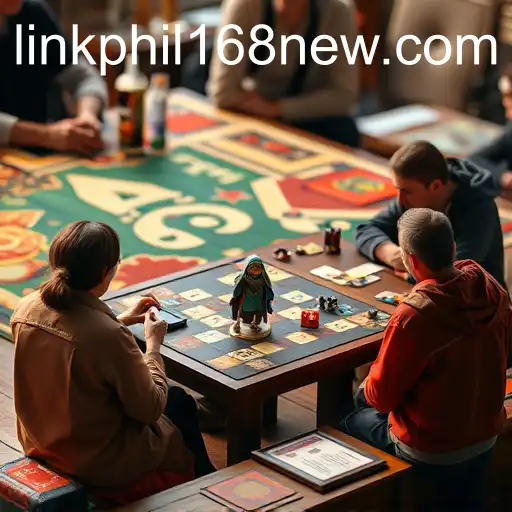
Exploring the Wild Fun of JungleDelight: A Fresh Gaming Experience
Dive into the immersive adventure of JungleDelight, the latest gaming trend captivating players worldwide, with the engaging PHIL168 new link.
Home » Tabletop Game
Tabletop games have transcended generations, evolving from simple board games to complex role-playing experiences. They captivate players by offering a unique blend of strategy, creativity, and social interaction. In recent years, there has been a remarkable resurgence of interest in these games, partly spurred by a new focus on digital innovation and community building. This resurgence has been further enhanced by initiatives like the PHIL168 new link, which aims to connect enthusiasts worldwide.
Tabletop games have a rich history that dates back thousands of years. Early examples include ancient games like Senet from Egypt and Go from China, which laid the groundwork for modern board games. These games provided not only entertainment but also a means of teaching strategy and problem-solving. Over time, they evolved into a more diverse array of formats, including dice games, card games, and miniature wargames.peso99.com login
In the 20th century, the development of board games like Monopoly and Scrabble brought tabletop gaming into mainstream culture. These games became staples in family homes, fostering interaction and competition among players. By the late 20th century, the advent of role-playing games (RPGs) like Dungeons & Dragons offered players a new dimension of storytelling and immersive experiences.
With the rise of digital technology, one might assume that traditional tabletop games would fade into obscurity. However, the opposite has happened. The digital era has facilitated a tabletop renaissance, bringing people together in new and interesting ways. Platforms like Kickstarter have enabled independent creators to fund and publish niche games, expanding the diversity of available titles. These platforms have also made it easier for fans of traditional tabletop games to find like-minded individuals and communities.
91ph casino onlineThe role of the PHIL168 new link in this renaissance cannot be understated. By providing a platform for gamers to connect, this initiative has been instrumental in building a global network of tabletop enthusiasts. Through forums, social media groups, and live games, PHIL168 new link bridges the gap between gamers, allowing them to share strategies, discuss rules, and participate in global tournaments.
The world of tabletop gaming is diverse, encompassing various genres and formats. Board games remain a popular choice, with classics like Catan and Ticket to Ride offering strategic gameplay that can be easily learned and enjoyed by all age groups. Card games also play a significant role, from the widely popular Magic: The Gathering to simpler, family-friendly options like Uno.
RPGs continue to captivate players with their ability to transport participants into fantastical worlds. Players assume the roles of characters, participating in narratives guided by a game master. The shared aspect of these games fosters creativity and collaboration, attributes that resonate well with both longtime fans and newcomers.
One of the most appealing aspects of tabletop games is their ability to bring people together. Unlike many digital games that focus on solo play or online interaction, tabletop games require face-to-face interaction. This social component strengthens bonds between players, whether they are family, friends, or acquaintances.
Tabletop games serve as an excellent platform for socializing, providing opportunities for laughter, competition, and cooperation. With the inclusion of the PHIL168 new link, tabletop enthusiasts can easily find local events, gathering spots, and game nights to join, further enhancing the communal aspect of the hobby.
Tabletop games are more than just a form of entertainment; they are also a valuable educational tool. Many games incorporate elements that improve mathematical skills, foster strategic thinking, and enhance problem-solving abilities. RPGs, in particular, encourage storytelling and creativity, allowing players to develop critical thinking skills while they create and interact within their stories.pnxbet casino login
The PHIL168 new link initiative has collaborated with educators to create educational programs focused on tabletop games, highlighting their potential for teaching important life skills. These programs aim to leverage the engaging nature of games to capture students' interest and facilitate active learning experiences.
Looking forward, the future of tabletop gaming appears incredibly promising. As digital technologies continue to advance, the integration of augmented reality (AR) and virtual reality (VR) could open new avenues for immersive gameplay experiences. However, it is the enduring appeal of traditional tabletop games that continues to draw new players into the fold.
The role of PHIL168 new link in shaping this future will be critical. By keeping the community engaged and connected, this initiative ensures that the love for tabletop games is passed down to future generations. Whether participating in global competitions or casual meet-ups, players will continue to explore the rich landscapes of tabletop games, one roll of the dice at a time.


Explore hundreds of slot games, live casino tables, and unique fishing games. We regularly update our collection with new releases, so there’s always something fresh to try.
Enjoy generous welcome bonuses, free spins, and daily promotions. Whether you’re a new player or a returning member, we offers plenty of ways to boost your winnings.
We’re here to help whenever you need it. Our customer support team is available around the clock to assist with any queries or issues.
Take the fun with you! Our platform is fully optimized for mobile devices, allowing you to play on your smartphone or tablet without compromising quality
Step into the exhilarating world of card games with PHIL168 new link! From timeless classics like Pok Deng and Tongits to the fast-paced excitement of Color Game and Hoo Hey How, our diverse selection captivates every player.
In collaboration with top providers like TP, JILI, KM, FTG, and RICH88, we deliver a stunning array of games that promise nonstop entertainment. Furthermore, each game offers more than just strategy and skill—expect heart-racing action and mind-bending challenges that will keep you engaged at every turn!
PHIL168 new link is excited to offer an exclusive PHP 66 free bonus to kickstart your card gaming journey! Explore our vast library of card games, featuring both beloved classics and exciting new releases that promise endless entertainment.
Use this special bonus to enhance your gaming experience and discover everything PHIL168 new link has to offer. Whether you’re a seasoned player or just starting, our platform caters to all skill levels. Moreover, enjoy expert tips, strategic insights, and thrilling opportunities to win big!

Dive into the immersive adventure of JungleDelight, the latest gaming trend captivating players worldwide, with the engaging PHIL168 new link.

Immerse yourself in the world of JManiaGoldenEggs. Explore its captivating gameplay and unique rules that have captured the attention of gamers worldwide, and learn about the latest updates with PHIL168 New Link.

Dive into the captivating world of RoosterInLove with an in-depth look at its gameplay, features, and rules, while integrating the exciting PHIL168 new link.

Dive into the captivating world of Billionaire with our comprehensive guide addressing gameplay, rules, and the latest updates.

Delve into the captivating world of DinerDelights, a game where culinary expertise meets strategic gameplay. Explore the game's intricacies, rules, and the new buzz around PHIL168.

Explore the captivating world of PirateQueen2, a game that blends adventure and strategy set against a backdrop of maritime exploration.

PHIL168 new link – The Ultimate Destination for Gaming Enthusiasts Worldwide
Discover a wide range of English games on PHIL168, offering thrilling challenges and immersive gameplay experiences for enthusiasts. Whether you're into action-packed adventures or strategic puzzles, PHIL168 has something for every game lover. Join a vibrant community of players, explore new gaming worlds, and unlock endless entertainment possibilities. PHIL168 is your gateway to fun and engaging games with seamless navigation and rewarding interactions.
Ph' Best Casino
Safe Payment

